#the sufferings of Saint Charles
Text
according to TG1, some people have nicknamed the 2023 Ferrari SV for San Valentino ❤
#i love it when cars have nicknames....#last year she was rossonera#san valentino help me pateron saint of epilepsy beekeepers and lovers#may our car not suffer epileptic breakdowns may we keep the bees at bay and harvest the honey of our labor#protect our holy lovers (charles leclerc x sf-23) so that they may have a successful and harmonious marriage#amen#maranello.txt
36 notes
·
View notes
Note
🐈⬛ i don’t have a specific request but I can’t get the phrase “don’t hex and drive” out of my head. maybe driver reader who’s witchy and starts cursing anyone who’s rude to her boys right before a race sksjsks
thank you for requesting!🫶🏽
.
“What a bunch of little c—”
“Amor, it’s fine.”
You snapped your head around, your eyes narrowing at your boyfriend sitting on the couch. “No, Carlos. No, it’s not.”
He sighed. “No, but I need you to calm down before you do something stupid.”
You almost wanted to scoff at him.
It was ridiculous. It was ridiculous that such a historical and iconic team could make Formula Two teams and lower leagues look like saints. It was ridiculous that you had to watch your boys suffer through mistakes and situations that weren’t their fault. It was ridiculous that just when you thought Ferrari couldn’t fuck up anymore, they always seemed to find a way.
And it was ridiculous the way your boys had been conditioned by their own team to deal with it.
And maybe you should have been glad that such a fierce competitor was no longer such, but you couldn’t care less about that when it was the loves of your life who were suffering. You didn’t care if it made your races easier. You didn’t care when it was chipping away at the men you love and making them shells of who they were at the start of the reason.
“They need to get a grip of themselves,” you said bluntly, your brows furrowed together as you glared at the prancing horse logo on the wall of Charles’ driver room.
“Yes, but Carlos is right,” Charles said as he reached his arm out to tug you closer, to pull you down on the couch that both boys were currently sitting on. He nuzzled you to sit between them, squished between both Ferrari drivers who just looked exhausted. “When you get angry, you don’t think clearly.”
“I’m thinking very clearly right now,” you retorted as you crossed your arms over your chest with a huff. “And what I’m thinking is that everyone on that pit wall can enjoy my foot up their—”
“And there she is,” Carlos murmured, though his tone was light-hearted as he wrapped an arm around your shoulders and tucked you into his side. “We don’t need you fighting our battles, amor.”
“I know,” you sighed deeply.
“We will sort this out with the team,” he added.
“Yeah, yeah,” you grumbled.
“So no magic, okay?”
You paused.
“Cherie,” Charles muttered as you continued to avoid both their stares. “No hexing and driving, remember?”
“But—”
“No magic. We can deal with the grid penalties on our own,” Charles told you in a softer voice. And you believed them. You knew what your boys were capable of, but your lack of faith resided with the team rather than them.
“How about a teeny hex?” You bargained as you looked between them. “Nothing big or serious, it will be harmless.”
Neither Charles nor Carlos looked convinced.
“Something like…if they fuck up either of your races today, they will have clown noses stuck to their faces for a week?” You suggested, watching the way Charles had to press his lips together to withhold his giggles.
“Mi amor,” Carlos scolded softly but you could see the smile on his face.
“Please?” You murmured, giving the boys your puppy dog eyes that you knew they wouldn’t be able to resist. “If you won’t let me spell the cars with good luck, at least let me do this.”
The boys shared a look with each other, a few beats of silence passing between you three before Carlos spoke.
“Fine—”
“Yes!” You grinned.
“But nothing more,” Carlos quickly added, shooting you a look. “And this is the only time.”
“Promise,” you said with a smile on your face that didn’t reassure Carlos in the slightest, but he knew there was no stopping you when it came to defending them.
“Thank you for caring,” he added in a softer voice.
“Always,” you said as you reached your hands out, taking each of their hands in your own as you intertwined your fingers. “I’ll always defend you both. After all, I like seeing you on the podium with me.”
“In second and third,” Charles commented with a snort.
You shrugged. “I like the view from up on the top spot, you can’t blame me.”
“If you wanted to look down at us, you just had to ask for us to get on our knees, mi amor,” Carlos commented, grinning a little himself when he watched a blush spread across your cheeks.
“What was that, Christian? You need me for data review? Okay!” You announced suddenly as you scrambled to get up from the couch, your body flushing at his words and the boys laughing as they tried to pull you back down.
.
#cece's slumblurb party#charlos#charles leclerc#carlos sainz#formula one#f1#charles leclerc x reader#charles leclerc x you#charles leclerc x y/n#charles leclerc fic#charles leclerc one shot#carlos sainz x reader#carlos sainz x you#carlos sainz x y/n#carlos sainz fic#carlos sainz one shot#formula one x reader#formula one x you#formula one x y/n#formula one fic#formula one one shot#f1 x reader#f1 x you#f1 x y/n#f1 fic#f1 one shot
372 notes
·
View notes
Text
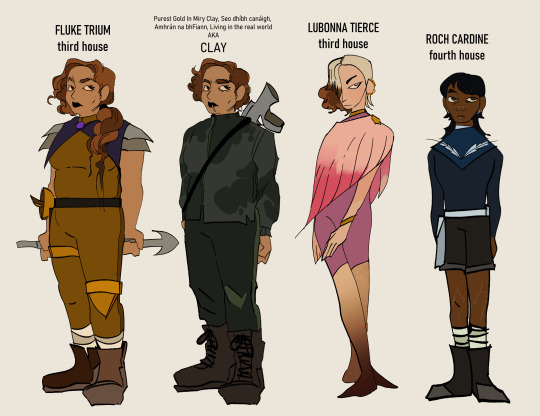
quickly sketched out my tlt ocs to explain them to oomf
roch cardine is a fourth house medic! their dog is a newfoundland named guinuea. from saint guineafort. roch is from saint roch saint of dogs, cardine from.the 4 cardinal virtues. 4 in biblical meaning is often attributed to the 4 creatures around gods throne as well as symbolizing completeness
"temperance is love giving itself entirely to that which is loved; fortitude is love readily bearing all things for the sake of the loved object; justice is love serving only the loved object, and therefore ruling rightly; prudence is love distinguishing with sagacity between what hinders it and what helps it."
the four cardinal virtues
shes on the field but specializes more in second-based magic in siphoning life from her…dog… to power the injured. haha! :] shes in the same sort of generation as fluke and lubonna. everyone makes fun of her for having that damn dog
in the THIRD HOUSE theres fluke trium (cav) and lubonna tierce (necromancer). lubonna is a prior princess before the tridentarii existed. fluke is from a type of wormlike parasite, lubonna from charles lucian bonaparte who introduced the Phoenicopteridae family (flamingos). flamingo because they get their color from the feeding on brine shrimp - you can see that lubonna actually has flukes hair attached to it - she chews flukes hair off for power but uses the tips as um. extensions :)
lubonna thinks of them like jennifer and needy. but when lubonna pushes fluke too far in a shepherd planet interaction with BOE, fluke fucking kills lubonna and joins boe
a few years later roch and their dog guinea are kidnapped by boe - roch is gravely injured and so is guinea. both could have technically healed given time but in their desperation to escape they siphoned too much from guinea and… he died. sorry.
roch is kept in BOE as a prisoner of war. now we have a third house cav that picked life at the cost of feeling disgustingly alone and betrayed, and a fourth house healer that chose solitude and power instead of suffering with company. they have a hatething going on
77 notes
·
View notes
Text
The churches of the town of Dunwich slowly falling into the sea one after another, as described in a topographical and historical description of the county of suffolk (1829):
"Gardner, in his historical account of Dunwich, observes, that one of the two carves of land, taxed in the reign of Edward the Confessor, was found to be swallowed up by the sea, at the time of the survey made by order of William the Conqueror.
The church of Felix, and the cell of monks, were lost very early. In the first year of Edward the Third, the old port was rendered entirely useless, and before the twenty-third year of that king's reign, a great part of the town, with upwards of 400 houses, which paid rent to the fee-farm, with certain shops and windmills, were devoured by the sea.
After this the church of St. Leonard was overthrown; and, in the fourteenth century, the churches of St. Martin and St. Nicholas were also destroyed by the waves. In 1540, the church of St. John Baptist was taken down; and in the same century the chapels of St. Anthony, St, Francis, and St. Catharine, were overthrown, with the South Gate and Gild Gate, and not one quarter of the town left standing.
...
In the reign of Charles I, the foundation of the Temple buildings yielded to the irresistible force of the undermining surges, and in 1677 the sea reached the market-place.
In 1680 all the buildings north of Maison Dieu lane were demolished, and in 1702 the sea extended its dominion to St. Peter's church, on which it was divested of the lead, timber, bells, and other materials, the walls only remaining, which tumbled over the cliff as the water undermined them; and the town hall suffered the same fate. In 1715 the gaol was undermined and in 1729 the farthest bounds of St. Peter's churchyard fell into the sea.
In December 1740, the wind blowing very hard from the north-east, and continuing for several days, occasioned terrible devastations for a great part of the cliffs were washed away, with the remains of St. Nicholas's churchyard, as also the great road which formerly led into the town.
...
All Saints, as observed before, is the only church of which any portion is still standing.*"
*All Saints Church has, since this account was written, entirely fallen into the sea.
#thoughts#cliff blogging#i think i'm going to make a separate post about all saints because it's so interesting & there are a lot of images & descriptions
45 notes
·
View notes
Text
Theory: Cinder is the king Jaune's Joan of Arc is looking for
*sniffs*
Ah, nice clean air over here, time to pollute it with some more Knightfall speculations.
Cinder as king Charles VII (king Joan of Arc helped) is something I brought up in several of my theories, most notably Indecisive King one (that I will link below).
However, in those theories I mostly just briefly touch the subject or in case of Indecisive King theory I mostly talk about parallels between Joan of Arc and Indecisive King story. I wanted to make comprehensive theory on why do I think Cinder is Charles VII in vacuum of Joan of Arc story. Some points will inevitably be repeated from previous theories.
CHILDHOOD:
Charles was born in hotel Saint Pol, French royal residence. This of course could all be massive coincidence, but just as same could be the reason why writers chose Cinder's childhood to be in Glass Unicorn, another hotel. Cinder's backstory is relatively straight forward Cinderella story, so when you change setting from private residence to hotel, it does stick out. Devil's advocate within me tells me that can be explained by writers wanting for her abuse to be public so it can fuel her later resentment towards the world. But at the same time, of all places one can be publicly abused in, they chose hotel. Another direct parallel is that both end up permanently leaving it at age 15 (although this one can be explained by them wanting to give Cinder same age as Ruby when her story truly begins), never to return, but let's not get ahead of ourselves.
Charles was 11th child of Charles VI and Isabeau of Bavaria, but for the sake of the argument, he is the third child because girls are stinky and don't matter in French succession laws. This greatly diminished his position and he was never expected to amount to much besides ruling a duchy. However, his position was greatly improved due to deaths of both of his older brothers, making him heir apparent. Unlike Cinder, Charles had nothing to do with their deaths but his political opponents did accuse his faction of poisoning both of them. So we have another parallel, albeit weaker one: both were raised in shadow of 2 older siblings who ended up dying young.
____________________________________________________________
Charles became heir to the throne at age 14, or Dauphin (and to avoid confusion, I will from now on refer to him as such). Another benefit of becoming Dauphin is that he became regent to his father Charles VI, who was suffering from severe mental illness. However, his mother wanted to rule instead of him as a regent creating a rift between them. Dauphin put his mother under house arrest and took over as sole regent. His mother would never forgive him this and became his political enemy. She allied herself with duke of Burgundy, John the Fearless, another one of Dauphin's political opponents. John and his forces entered Paris and attempted to capture Dauphin who managed to escape. This is where his escape from hotel Saint Pol and slanders about his faction killing his brothers come from. Dauphin and John attempted to reconcile their differences, but at one of their meetings, at Montereau, Dauphin's men murdered John.
This has several parallels. First of all, both Dauphin and Cinder had bad relationship with their mothers, being their enemy in both cases. Rift emerging due to said mothers wanting to control them. Although resolution of conflict is different, Dauphin puts his mother under house arrest, while Cinder had more... permanent solution. This is where John the Fearless comes in, or in Cinder's case Rhodes. Both are model warriors of their respective cultures (former was crusading knight, latter was huntsman) that came after Dauphin/Cinder to capture them for their transgressions. Their capture attempt failed, leading to their eventual deaths. You can even draw a small parallel between Dauphin attempted reconciliation with John and Cinder pleading with Rhodes, both of which failed. That's one interpretation of end of Cinder's flashback events, here comes another.
The fact Dauphin murdered duke of Burgundy destroyed his reputation. Duke's son Philipp started negotiating with English and gave them his support. Together, English, Burgundians, king Charles VI and Isabeau of Bavaria concluded Treaty of Troyes, which disinherited Dauphin and made English de facto rulers of France. Upon subsequent failing to appear in front of court, Dauphin was also declared traitor, outlaw and was banished from the realm.
When you combine this with previous incident of Dauphin murdering duke of Burgundy, you get alternative read of the events. Duke of Burgundy is now Madame instead of Rhodes, who takes the role of king Charles, intervening after murder happened. Reason I feel Rhodes is good read for Charles VI is because both characters are relatively inactive up until this moment of the story (Rhodes knew Cinder was abused yet did bare minimum, Charles VI on the other hand was mostly a puppet of powerful nobles like duke of Burgundy), both are father figures (or literal father in Charles' case), both took Dauphin/Cinder under their wing as their successors, both disinherited and declared Dauphin/Cinder an outlaw after they murdered someone. Either way you read it, parallel stands. Both Dauphin and Cinder lashed out and murdered person trying to control them and as a result became an outlaw and abandoned by their father figures.
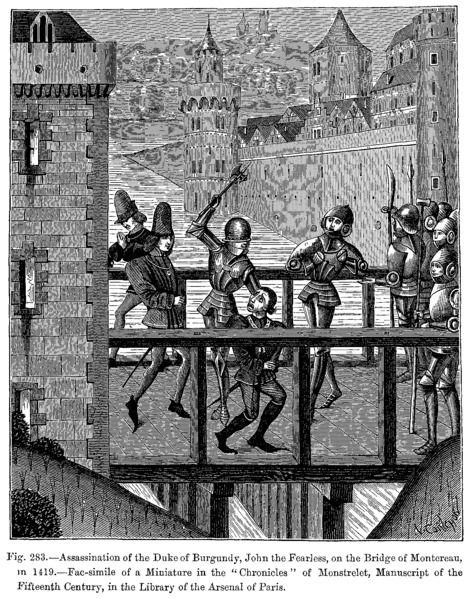
RISE TO POWER:
Combined force of Burgundians and English forced Dauphin to escape to Southern France where he had much more support thanks to his connections to Anjou dynasty. His main benefactor was Yolande of Aragon, powerful queen dowager and so called Queen of Four Kingdoms (Aragon, Sicily, Cyprus, Jerusalem). She had massive influence on Dauphin and became a mother figure to him.
Now, we don't now how Cinder started working for Salem, but considering last time we saw her in her flashback she was wanted criminal, it's safe to say she was either saved by Salem or somehow sought her out. Whatever happened out of these two interpretations, it matches with Dauphin taking refuge in Yolande's lands and her protecting him. Similarities between Yolande and Salem are simple but obvious: both are powerful queen dowagers, both are mother figures to Dauphin/Cinder. Even Yolande holding title Queen of Four Kingdoms works with Salem, being most powerful being in all of Remnant's four kingdoms. Difference is that Yolande was mostly benevolent towards Dauphin (although Yolande was political realist and did lot of it for her own benefit), while Salem was shown to be highly abusive towards Cinder, mirroring Madame's treatment.
__________________________________________________________
When his father died in 1422, Dauphin proclaimed himself King of France, despite losing that right due to Treaty of Troyes. On top of that, Dauphin could not be properly crowned due to traditional French relics being held in hostile territory in Rheims. This made his claim lack legitimacy, especially considering newborn English King Henry VI was also proclaimed the King of France. During the ceremony, he married Yolande's daughter Marie, becoming Yolande's son in law.
I've mentioned this several times in my theories, but Maidens are basically royalty. Not under all circumstances, but they definitely are when looked through the lens of medieval Europe. Kings were God's emissaries on Earth which gave them legitimacy among the common people. Similar to that, Maiden powers have divine origin. Both are transferred hereditarily and in the story number of Maidens matches number of kingdoms. I hold similar stance for Silver eyes and Ozma's incarnations. So Cinder proclaiming herself Fall Maiden does fit Dauphin proclaiming himself king of France.
Both of their seizures of power go against the established law (Dauphin defying Treaty of Troyes, Cinder defying both Amber's and Ozpin's choice). In both cases there is a catch to their seizure of power: Dauphin cannot reap the full benefits of being the king due to lack of legitimacy, Cinder cannot fully use Maiden powers due to only having half of them. Since Cinder's attack on Amber happens before plot begins, it's also possible her ages matches that of Dauphin when he proclaimed himself the King, 19 (Cinder is in early to mid twenties at the beginning of the show, if event takes place few years back it is entirely possible). Dauphin's lack of legitimacy can be translated again to Cinder after she fully takes Fall Maiden powers but is unable to locate "her" relic, Crown of Choice. Just like Dauphin is King without the crown, so is Cinder Maiden without the Crown.
Marriage to Yolande's daughter is less clear parallel, but I feel like this relates to Cinder's grimmification. Dauphin is married to Marie after proclaiming himself as King of France while Cinder ends up grimmified in immediate aftermath of obtaining Fall Maiden power. Salem is Queen of Grimm and was shown to be control them, making them effectively her children. Grimmification is something that binds Cinder to Salem, just like marriage to Marie binds Dauphin to Yolande as family.
Another parallel comes from other claimant for the French throne, newborn Henry VI. Due to being newborn, decision making was delegated to his regent, Duke of Bedford. This is double parallel. One is to Amber, direct rival to Fall Maiden power who due to her coma was unable to make any decisions on her own (making Ozpin her regent). Amber also held her power "legally" (and Henry VI is technically legal ruler due to Treaty of Troyes) while Cinder is usurper. Other parallel is to Ruby, being more significant rival to Cinder. This works with their age gap (although not as massive as with Dauphin and Henry), especially since Cinder derisively refers to her as a child. Other is symbolic, both Henry and Ruby have rose as family emblem.
______________________________________________________________
Dauphin would attempt to seize the rest of the France on several occasions. At first having some success (and getting some important alliances through Yolande's diplomacy), but suffering series of devastating defeats like those at Cravant (1423) and Verneuil (1424). Eventually, Burgundians and English would go on offensive and attack Dauphin's holdings, starting the siege of Orleans (1428).
This is pretty straightforward: Cinder's main goal is seizing all Maiden powers and she had exactly zero success with that after seizing Fall Maiden power back in Volume 3. Additionally, she is yet to seize the Crown or even find out where it is. This matches Dauphin being unable to become sole legitimate ruler of France or be properly crowned. In both battles of Cravant and Verneuil, French had massive numerical advantage, but lost to superior Anglo-Burgundian leadership. This matches to Cinder getting foiled both at Haven and Atlas. You might argue she won at Atlas, but not really. Salem won, being given two Relics, Cinder's long term goals went unaccomplished. Initially successful diplomatic game Dauphin's side had can also be paralleled to White Fang and Bramwen tribe temporarily allying themselves with Cinder. But just like in Dauphin's case, that advantage has been lost with entire Remnant now uniting to combat the threat of Salem.
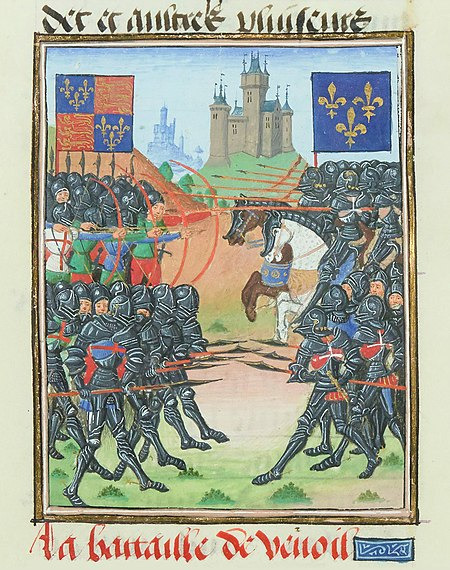
UNWORTHY KING:
In this section I will go over some known Dauphin's traits. He was described as notoriously weak, passive and indecisive man. Hesitant to take action and reliant on advice of his court favorites. He lacked real authority which was even exploited by his various subjects (there were several cases in which King had to ransom his own servants after his commanders captured them). This is mixed bag when compared to Cinder.
On the one hand, you do have parallel of both Dauphin and Cinder always being under someone's control (Armagnac faction, Yolande and powerful advisors like Tremoille in Dauphin's case, Madame and Salem in Cinder's). On top of that, there is some illusion of freedom in both cases. Dauphin thought he'd be free after he imprisoned his mother and killed his political rival, yet he simply felt under control of different individuals. Similarly, Cinder thought she was free after she killed Madame and Rhodes, only to end up in similar relationship with Salem.
However, passivity is something that's hard to come by with Cinder. She is one of the most active and goal oriented characters in the entire story. Indecisiveness also doesn't fit, but I feel like this one is only temporary. Cinder will eventually have to face the prospect that her quest for power is completely doomed and without any plausible winning scenario (No matter how things play out, she'll either end up as Grimm or die fighting). If this does happen, then you can be sure as hell indecisiveness will show up. Highly detrimental passivity and indecisiveness are traits that parallel Dauphin more with Indecisive King from the Remnant fairy tale of the same name (Which I theorized is based on Joan of Arc story).
Lack of authority is interesting one. Cinder wants to control everything around her, best seen with her attempts with Emerald and Mercury. However, more often than not, her comrades show minimal respect for her (Tyrian, Neo, Watts) and she is abandoned even by her supposedly loyal cohort (Emerald left her, Mercury distanced himself from her). So despite her best attempts, she does indeed lack authority.
______________________________________________________________
Another important aspect of Dauphin is his worthiness. Back before he even killed John the Fearless, there were malicious rumors about him made by his political opponents. Basically, they claimed he wasn't Charles' son, instead, he was bastard child of Duke of Orleans, his uncle. This narrative was popularized after he became an outlaw and was basically treated like an open secret. Although this rumor was popular among his enemies, it was never made official due to them not wanting to embarrass King Charles VI by implying he was cucked by his brother. Dauphin at some point started losing the faith in his cause, even potentially starting to believe he was indeed a bastard. Why do I say the latter? When he first met Joan of Arc, he somewhat believed her but was hesitant. However, one day, she whispered something in his ear, something so important he put full faith in her abilities. Joan would never reveal what she said to him, even at her heresy trial. However, Dauphin would reveal it years later when he met Joan of Arc impostor. He asked her what secret did she whisper to him when they met in Chinon. Impostor immediately revealed herself to be fake and King revealed real Joan said "you are rightful king". So King did in fact at some point have massive doubts in his worthiness.
Ok, what does this have to do with Cinder. Very simple, lack of self worth is one of Cinder's most important traits. This is best seen with her mantra she repeats with both Madame and Salem (without you I am nothing...), but more importantly in her interaction with Watts in Volume 8. After Watts calls her unworthy, she lashed out at him and then broke down crying. Cinder is essentially deluding herself into thinking she'll only be worth something if she has all the power in the world. She needs someone to tell her that she doesn't, that she is already worthy. Who better to tell her than person who also has massive self worth issues due to their perceived lack of strength (and is blond and Joan of Arc shaped). Additionally, this is in line with Fall Maiden lesson from Tale of the Seasons, another Remnant fairy tale. Fall Maiden teaches Old Man that he should be satisfied with what he's already got.
Another thing to throw in here is conspiracy theory from Joan of Arc era. Might seem bit random, but what the hell, when am I ever gonna talk about this. Basically, people speculated what did Joan say to the King. Most popular theory was that she revealed she was also Duke of Orleans' bastard child and his half sister. This works interestingly with Jaune and Cinder. Not saying Jaune is gonna drop a bombshell and reveal Cinder is his half sister, more that he is gonna reveal to her that they are same. Jaune and Cinder as characters have several major parallels (aforementioned lack of self worth, lamentation of their weakeness, experienced bullying, forced by circumstances to commit their first murder, emotional isolation, etc), their defining moment will be Jaune revealing to Cinder that he understands what she went through, leading to her redemption.
______________________________________________________________
Last thing I want to cover is first meeting between Joan and Dauphin. He heard rumors about Joan being supposedly divinely guided and wanted to test that. He dressed himself as one of his courtiers and had courtier take his place in the room. Since Joan never met Dauphin, expectation was she wouldn't realize swap has been made. However, to everyone's shock, Joan walked up to supposed courtier and referred to him as Dauphin, seeing through his ruse.
While there are some parallels here between Cinder and Dauphin with both wearing both literal and symbolic disguise (and Joan/Jaune seeing through it), what I wanted to focus on is parallel to Cinderella story, more specifically Grimm version. Prince was capable of seeing through Stepsister's ruse (in Grimm version they mangled their feet to fit the slipper unlike Perrault version where it doesn't fit) thanks to warning from doves. Similarly, Joan is capable of seeing through Dauphin's ruse thanks to her Voices (and doves are associated with God in Christianity, so both are essentially divinely guided). Both are then guided to pick most unlikely looking option, that turns out to be the person they are looking for. There is an interesting inversion between Dauphin being real king but fake servant and Cinderella being fake princess but real servant.
_____________________________________________________________
Anyways, I rambled enough about this for today. I wanted to cover Dauphin's story from his childhood to meeting Joan and draw every possible parallel I can think of between Dauphin and Cinder. As usual feel free to comment if you feel like I missed something or you have your own interpretation.
17 notes
·
View notes
Text
Today we venerate Ancestor & Hoodoo Saint, Charles Deslondes on the 212th anniversary of his passing. 🕊
(Updated 2024)
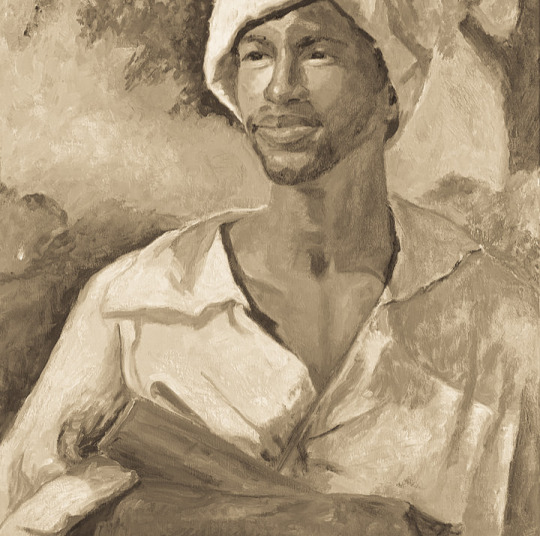
Deslondes was a Haitian-born brotha, believed to be from Saint Domingue, who was forced into the role of overseer on the Andry Plantation in Louisiana until he took up arms against them.
He was born on the Jacques Deslondes plantation around 1789. He was described as being as a “Creole mulatto slave by the name of Charles, “about 16 years old" & recorded to be a “field laborer.” Later, he was sold to the Andry Plantation of Col. Manuel Andre & forcibly worked as an overseer to 86 enslaved Afrikans.
Eventually, he organized enslaved Afrikans & maroons ahead of the legendary German Coast Uprising in what is now St. John the Baptist Parish, part of the German Coast off the Mississippi River.
On Jan 8th, 1811 Deslondes & 14 others attacked their slave "master" Andry Sr. (of the Andry Plantation in St. John's Parish) & killed his son. While Andry Sr. escaped, Deslondes & allies swept the plantation & fled into the Louisiana Territory. By January 10th their numbers swelled to 400-500. They successfully killed yet another slave "master", sending Whites from the area fleeing into New Orleans.
The governor of the Louisiana Territory assembled a militia of volunteers + 700 U.S. Army Troops & Navy Sailors to end to the rebellion after receiving intel on Deslondes' next move by the foolish few who betrayed Deslondes & Co in exchange for their own freedom.

"His hands were chopped off upon his capture; he was shot in both thighs and bullets were riddled throughout his body. Before he passed, his body was shoved into a bundle of straw and he was roasted alive as a warning to other rebels and "free" folks. [Later, he was decapitated & joined the heads of other rebels that were put upon spikes posted along major roadways throughout New Orleans.] - as described by the U.S. Navy.
We remember Deslondes for his unprecedented leadership & bravery that spearheaded the first & bloodiest rebellion on U.S. soil of his time. We remember him for his cleverness, courage, & heroism that inspired so many others to liberate themselves rather than beg for something that cannot be given by man. We remember him for his immeasurable suffering & for giving the ultimate sacrifice for the love of us.
We pour libations & give him his 💐 today. Offering suggestions: light a white candle, libations of water, & Haitian cuisine.
‼️Note: offering suggestions are just that & strictly for veneration purposes only. Never attempt to conjure up any spirit or entity without proper divination/Mediumship counsel.‼️
#hoodoo#hoodoos#atrs#atr#Hoodoo Saints#Hoodoo History#charles deslondes#the german coast uprising#german coast uprising#andry's rebellion#ayiti#creole#Louisiana#black history#thehoodoocalendar
137 notes
·
View notes
Note
Hi !
Can you do one where you are married to tommy but he still hung up on grace and treats you badly and pushes you away , but overall your still smiley and your tge only thing to make the arrow house warm and kind .
Tommy starts to yearn for you and try to take you to his bed and hold , but what distroys him is when he finds you sleepibg with a man ( or woman your choice ) but still he prefers to live in denial than you leaving him.
Why do i always request angst ? ITS A DESEASE
Okay so I cranked it up to a ten and holy shit , I think imma need a break from writing angst.
Grab your kleenex, your handkerchief or your sleeve cuz this one is going to crush your soul.
I know because it crushed mine as i wrote it.
Tw: miscarriages,mentions of blood, child loss due to illness, cheating and unending suffering.
Gif by @littlegirlinvisible
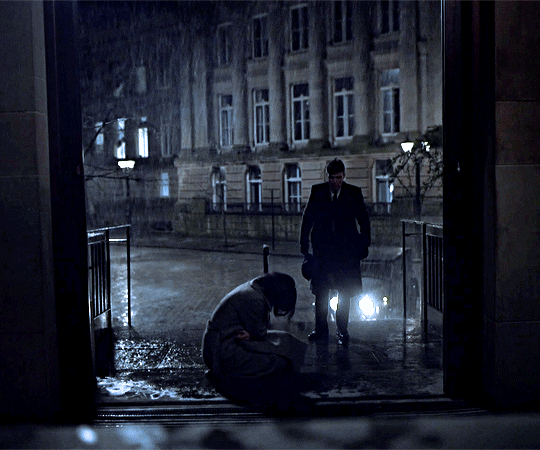
The Curse
You knew why he had married you.
You had no problem with that, well you used to but you outgrew that naivety when you found a ledger with all the whores he paid for whenever he was away.
With all that fucking you think he’d make a fortune as a gigolo.
With all that incessant pining over a woman who died a decade ago you’d think he’d never touch a woman after her.
But he had your precious Ruby was proof of that.
She was your everything, she was his everything. Especially when the MacMillans came and took their grandson away.
Turns out Saint Grace of wherever the fuck she was from had been a fucking idiot who had lied and said Charles was Clive Macmillian’s son to save face in a society that laughed at her in her stupid face.
Charlie had never been legally Tommy’s it seemed and the loss of that two-year-old when he met you at Churchill’s office was the reason you ended up replacing Grace.
You’d come to know that Thomas had fucked over Section D who then realized he had not adopted his boy. A boy he had gone through hell for, a boy that was his in blood but would never be his again.
He’d found comfort in her, friendship and sex. Three things that resulted in Ruby, Pearl and Amber.
You loved him and you thought he felt the same.
How wrong had you been.
So, when you had asked to remove Grace’s things and her portraits out of the foyer and into a sitting room no one used, he had grown angry.
Angry that you’d remove all traces of his love for Grace.
Angry enough to shout terrible things at you that made Pearl come too soon.
The doctors had warned you, Esme Shelby had too. The doctors said no stressing, no strong emotions, your pregnancy was high risk already without your husband making things worse for you.
Esme had told you that Grace’s ghost needed to be exorcised out of the house or she’d hurt you and Pearl.
But Tommy Shelby loves Grace and her malignant presence more than he loved his own baby daughter.
You swore you saw Grace Helen Burgess smirk when the blood began dripping down your thighs as he shouted things at you.
Grace Shelby hadn’t died because of a curse; Grace Shelby was a curse.
You came to hate her after that.
You hated her for the hold she had on your husband.
You hated her for killing your Pearl.
Ada hated her too.
Freddie’s lungs had been hurt when he was beaten within an inch of his life in prison because of Grace.
Freddie’s torture at the hands of Chester Campbell had left him unable to give Ada more children.
It was in your mutual hatred for Grace that you found solace in each other.
Ruby was born in 1928, three years after Pearl bled out of you because her daddy loved a dead woman more than her.
You had given up on your husband, you tried to make him love you, but he was impossible.
You threw away his drugs and booze when you found out you were pregnant. You went away and gave birth in your father’s estate because Grace can’t get Ruby there.
Ada had stayed with you the entire time. Held your hand when you gave birth and baptized Ruby even if she is Jewish now.
You loved Ada and she loved you.
You kissed her and she kissed you back, what you felt for her was real and she felt it to.
What you wouldn’t give to take Ruby, Karl and Elizabeth, and runaway together.
But then Tommy, like the dark cloud he is, showed up and you were forced to be Mrs. Shelby again.
You used to love him, but his fucking indifference turned the paradise you made for Ruby a hell for you.
But the two of you poured your love into Ruby and you had Grace’s portraits removed the second he left.
Its November 1934 when he finds out you’ve been doing that.
After Polly died, he became stone.
Stone who could only fuck, lie and make money. Even poor Ruby suffered his indifference now.
But the two of you had Ada, Karl, and Elizabeth.
And if Tommy had let you go to your childhood home, you would’ve had Amber.
Instead, Grace took her by pushing you down the stairs when Tommy came home from some work trip abroad.
He had seen it too, but still he let her do what she wanted. Feast on your suffering and his and the souls of your dead babies.
Amber was to be your last, your miscarriage had been so violent and so awful you were left unable to have any more children.
But he loved that parasite more than he loved his children.
More than Pearl.
More than Amber.
Stupid of you to think something would be different after a decade of hell with him.
But you had Ruby still, no one was more precious to you than Ruby Elizabeth Shelby.
Ruby is six when the doctor tells you she’s had cancer all her life.
Ruby is six when Zilpha Lee and Bethany Boswell do their best to save her, but in the end Grace wins.
Grace always wins.
Grace always takes what she wants.
And you die with your girl in that vardo.
And you are dead in spirit when he forces you to live on as his wife.
You hate him.
You hate him for all he’s let Grace do to you.
So, you take a knife to Grace’s portrait in the foyer.
So, you take everything he refused to let you put away and you make a bonfire with it.
Its 1935 when you finally rid your house of its curse.
Only Ada is with you that night, your fucking husband is seeking solace in the arms of a Nazi whore, so you fuck his sister in the bed you used to share with him.
“He’s dying, you know, only has months to live.” She tells you after the guilt of loving you returns vigorously that morning.
Let him die, let him join Grace in hell, you want to say, but you say nothing.
He comes home later that morning.
He isn’t angry, not yet anyways.
But you don’t care.
“Y/N!” he shouts for you when he doesn’t find you.
Its different this time. There is emotion and that tone that lets you know your fucking husband has finally taken his head out of his ass.
But you don’t care.
You want to destroy him for what he did to you.
You want to leave him in your past and never look back.
He wants you like you had been begging him to want you for the past fucking decade.
But you don’t want him anymore.
In fact, you want him to run here and see you love his sister, a woman who is so like him and so unlike him at the same time.
And he does.
And you feed on his hurt like Grace fed on yours because he loved her more than Pearl, Ruby and Amber.
“It’s too late, Thomas, you chose her so many times and now you will know how it feels.” You say with all the loathing he’s made you feel for him.
An outline that i had planned for part two but won't write
#thomas shelby x reader#thomas shelby x grace burgess#tommy shelby x reader#tommy shelby x wife!reader#thomas shelby x wife!reader#ada thorne#ada thorne x reader#ada thorne x fem!reader#ada shelby#ada shelby x fem!reader
352 notes
·
View notes
Text
Ruthless Representatives, Unjust Executions (3/3): Jourdan on the Death List
This is an addendum to the previous two parts of the series, which is in response to @josefavomjaaga's original post about Soult's account on Saint-Just condemning execution an artillery captain. In that post, Josefa also mentions that Soult talks about a proscription list Saint-Just had drawn up in case the French suffered defeat at Fleurus, including the commander-in-chief Jourdan and Soult himself.
I am suspicious of Soult's claim that Saint-Just had a death list he would enact in the event that Fleurus went badly, much less one with Soult's name on it. I doubt Saint-Just even acknowledged that Soult was a political threat, though the only evidence I have of this is the dearth of Soult in vol 2 of. the Œuvres completes of Saint-Just. Soult's name does not show up once, not even for promotion or praise; only that of his commander Lefebvre does. Soult's anecdote, however, led me to look into Saint-Just's correspondence with Jourdan, the other named member of this proscription list, and examine the veracity of Soult's statement regarding Jourdan. All translation errors are my own.
I think official correspondence, where one is required to be formal, rarely proves the emity between two parties unless they were spectacular rivals. That said, one would think the cordial tone Saint-Just uses when writing to Jourdan, then commanding the Army of the Moselle, would make Jourdan's inclusion in the proscription list dubious. Here is a letter of 8 priarial an II/27 May 1794, where Saint-Just broaches the idea of besieging Charleroi:
The representative of the people of the Army of the Nord to General Jourdan, commander-in-chief of the army of the Moselle.
I received your various dispatches. I pray that you continue to regulate your movements with this [Saint-Just's] army; we are still following the river Sambre, today our camp occupies the Tombe. We will try to seize Charles-le-Roi; you will take, without doubt, Dinant; then a corps of the army, which we will form at Maubeuge, will march on Mons, and another on Brussels.
I embrace my dear colleagues [representatives] Gillet and Duquesnoy. (p. 418)
It is impossible to deny that Saint-Just is domineering in this letter, daring to order Jourdan to do this and that when he has no military experience to justify it. Some writers, like Colonel Phipps in his series The Armies of the First Republic..., have interpreted this kind of civilian "meddling" as Saint-Just setting Jourdan up to fail. If so, the lengths Saint-Just goes to do so is odd. In Saint-Just's Œuvres, in a post-script to the letter to the Committee of Public Safety in Paris (pp. 419-420), Saint-Just mentions that he is writing to Jourdan every other day. He may have known nothing of soldiering, but being so hands-on with his correspondence implies he is rather anxious for Jourdan's success instead. (This is not to say he did not clash with Jourdan as Saint-Just tried to command him on military matters.)
Furthermore, Jourdan had survived as a commander of the Nord without death or disgrace. The Committee had already had a chance to behead him when they drew up a dimissal and arrest warrant for him. Instead, they ended up letting him go with a pension, indicating they still had trust in him.
It is also telling that, when difficulties occurred during the Siege of Charleroi, Saint-Just did not threaten Jourdan with arrest immediately. Once again, I reference Fischer's study of Jourdan during the Revolution. Fischer recounts that the revolutionary army suffered a defeat in 16 June 1794 during an Austrian army counterattack, because Lefebvre had run out of ammunition, pulled back, and Jourdan was forced to retreat (pp. 208-211). The revolutionary army suffered an estimated 3,000 to 4,000 casualties. To quote Fischer on what happened next:
Jacobin General; Jean Baptiste Jourdan and the French Revolution; 1792 - 1799. (Volumes I and II).
Jourdan's meeting with St. Just that night could not have been terribly pleasant. Although he promised the Committee that the army would take its revenge, a defeat was a defeat. Typically St. Just wanted to resume the offensive the very next day. Jourdan wished to rest the army for a few days, allowing them to replenish their provisions and ammunition. He also wished to attack elsewhere, because he was not happy with the tactical problems involved in besieging Charleroi. While he was ready to renew the offensive immediately as St. Just desired, he wrote that they "could do so more advantageously at another point." He promised to confer with St. Just and the other representatives to decide what to do. But St. Just and his colleagues were determined to continue to attack in the Charleroi sector. They granted Jourdan twenty-four hours to rest the army, and then the offensive was to recommence. (pp. 211-212)
Saint-Just, though portrayed by soldiers as guillotine-happy, did not "blow up" and condemn anyone for this seemingly random defeat. In this passage, Saint-Just does try to command Jourdan to do his bidding, but he is also capable of compromises. Lefevbre, partially responsible for the defeat, also seems to receive no consequential punishment. If Saint-Just wanted to accuse reluctant generals for cowardice and scapegoat someone for this setback, who better than Lefevbre and his chief-of-staff Soult, whose men somehow ran out of ammunition? As it stands, neither of their careers were affected by this incident.
In addition, at what points were officers more likely to be thrown in the brig or mount the scaffold? If the representatives wanted manpower, then we should note that officers were not universally condemned after a campaign when they could be substituted, nor were all the arrested universally executed. Even if they were dismissed, they could later gain employment. I think because the exceptions made more of an impression, the circulation of the executed officers' fates among the army exaggerated the (undeniable) injustice of the revolutionary military system.
In the end, after the success of Charleroi, Saint-Just gave credit to officers where it was due. While rumours swirled about Saint-Just condemning artillery captain Méras to death and threatening arrests of officers, he praised various officers, including Marescot of the artillery, in glowing terms to the Committee of Public Safety. As the Œuvres present:
On the 28th of last month, the army marched, one hour from the beginning, to meet the enemy; the enemy, at the same time, was marching on us. We met. The fog was thick; the fighting was terrible until three o'clock in the afternoon. The left, commanded by the brave General Kléber, worked wonders; general of brigade Duhesme distinguished himself there.The center fought the same way. General Dubois charged at the head of the cavalry, took five hundred prisoners, took seven pieces of cannon, and massacred seven to eight hundred men. The vanguard, commanded by General Lefebvre, had equal success and showed the same courage. A battalion of grenadiers charged the enemy cavalry three times and caused great carnage. Our gunners charged as hussars, and took back their cannons, which had been taken from them during the fog. […]
On the 30th, the siege of Charleroi was retaken with more determination than ever. The engineer officer Marescot did himself much honor by the activity with which he carried out the work. Artillery burned the city to ashes. […]
Jourdan must send you the honorable articles by which you will see that the pride of the house of Austria has come under the yoke. The prisoner garrison is three thousand men. We found fifty pieces of cannon. The place is in powder and is nothing more than a post. [...] (pp. 440-441)
As Saint-Just lauded figures he allegedly attacked, such as Marescot, and "defeated" generals such as Lefebvre, I am not particularly inclined to believe that Saint-Just was utterly ruthless. Still, a more balanced assessment of Saint-Just and Jourdan's relationship is in order. Let me close this post by quoting Fischer, who has studied this matter more in-depth:
Jourdan claimed in his memoirs that he once again felt as if he were fighting with a guillotine suspended over his head; one failure would cause the blade to fall. Undoubtedly he felt interfered with; he wrote no letters to the Committee after Fleurus praising St. Just's aid as he had after Wattignies praising Carnot's. St. Just's feelings towards Jourdan are more difficult to penetrate. At no point did he actually complain about Jourdan's generalship, indicating that perhaps their disagreements had not disturbed him as much as they had disturbed Jourdan. [...] Furthermore, St. Just was on excellent terms with Rene Gillet. It is unlikely that he would have been so friendly with such a close colleague of Jourdan if he had Jourdan marked for death. Even so it is hard to predict what would have occurred had he been defeated. St. Just might not have shown compassion for a general who had disagreed with him repeatedly, and who had compounded his sin by losing a battle. (pp. 218-219)
I hope that this series has been enjoyable to all who read it. A huge thank you to everyone who has read and supported this series, and as usual, feel free to add comments or additional information!
#jean-de-dieu soult#jean-baptiste jourdan#louis antoine de saint-just#memoirs#letters#frev#revolutationary army
13 notes
·
View notes
Text
THIS DAY IN GAY HISTORY
based on: The White Crane Institute's 'Gay Wisdom', Gay Birthdays, Gay For Today, Famous GLBT, glbt-Gay Encylopedia, Today in Gay History, Wikipedia, and more … January 20



c.275 AD. – St. Sebastian was born in the 3rd century AD. We know the date, but not the year. He is the patron saint of archers because he was bound to a stake and shot with arrows. He is also the patron saint of soldiers. As a beautiful young man he was the favorite of the emperor Diocletian who turned against him for embracing Christianity.
Some tales speculate that the Emperor Diocletian made romantic advances upon Sebastian and was enraged when Sebastian rejected him on Christian grounds. Other stories actually refer to Sebastian as the emperor's lover. Whether or not such accounts are legitimate, the image of St. Sebastian has been linked to homoeroticism.
According to the Church's official Acta Sanctorum, Sebastian, serving under the emperors Diocletian and Maximian, came to the rescue of Christian soldiers, Marcellinus and Mark, and thereby confessed his own Christianity. Diocletian insisted that Sebastian be shot to death by his fellow archers; these orders were followed, and Sebastian was left for dead.
These details—based on accounts written centuries after Sebastian's death and therefore largely apocryphal—may have helped form Sebastian's subsequent reputation as a homosexual martyr since his story constitutes a kind of "coming out" tale followed by his survival of an execution that may be read symbolically as a penetration.
In the Renaissance, Sebastian emerged as an extraordinarily popular subject for painters, perhaps rivaled only by Jesus and Mary; he was especially prized by artists who saw in the young saint a figure of Hellenic loveliness. Numerous painters—Tintoretto, Mantegna, Titian, Guido Reni, Giorgione, Perugino, Botticelli, Bazzi ("Il Sodoma")—recast Sebastian as a martyr beatifically receptive to his arrow-ridden fate.
It was primarily the Renaissance depiction of Sebastian that served a later, explicitly homosexual cult of St. Sebastian that took hold with remarkable force beginning in the nineteenth century, with Sebastian as an modern emblem of both a homoerotically charged object of desire and a source of solace for the rejected homosexual.


1900 – British actor Colin Clive (d.1937) is born in Saint-Malo, France to an English colonel, Colin Philip Greig, and his wife, Caroline Margaret Lugard Clive. He attended Stonyhurst College and subsequently Royal Military Academy Sandhurst, where an injured knee disqualified him from military service and contributed to his becoming a stage actor. Clive studied acting, and replaced Laurence Olivier in the stage play, Journey’s End, in 1927.
James Whale was the director of Journey's End. The two struck up an intimate relationship, and Clive played the lead in Journey’s End when it moved to the Savoy Theater in London in 1928. Clive was embraced by Whale’s theatrical friends including actress Elsa Lanchester. He followed Whale to New York City and Whale facilitated the casting of Clive in the movie version of the play.
Journey’s End was Clive’s first of 18 feature films. Clive appeared on Broadway in Overture. When the play closed, he went to London and starred with Elsa Lanchester in The Stronger Sex.
Clive is perhaps best known for playing the role of Dr. Henry Frankenstein in the James Whale-directed Frankenstein (1931) and in the Bride of Frankenstein (1935) with his friend Elsa Lanchester.
Though Clive was gay, he married actress Jeanne de Casalis in 1929, but the marriage was one of convenience, and they separated a short time later.
Clive was a member of the Brit ex-patriot actors in Hollywood including Lanchester, Karloff and Charles Laughton, and remained close with Whale.
The actor struggled with his sexual identity and suffered alcoholism and depression from an early age. His drinking became more and more problematic professionally. He often came to work drunk and passed out on the set. He was even fired from a starring role in a film when he suffered a breakdown.
Clive’s final film was in 1937, The Woman I Love. Colin Clive died on June 25, 1937, of tuberculosis complicated by chronic alcoholism. He was 37 years old. Actress Mae Clarke, one of his leading ladies, said, "Colin was the handsomest man I ever saw and also the saddest."

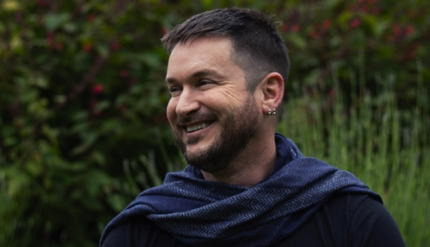
1971 – Darren Main is a yoga teacher and author currently living in San Francisco. He has written largely about Eastern spirituality for a more modern and Western audience. Main is best known for his second book, Yoga and the Path of the Urban Mystic. He has written several other books: Inner Tranquility: A Guide to Seated Meditation", "Spiritual Journeys Along the Yellow Brick Road"; a controversial book, "Hearts and Minds: Talking to Christians About Homosexuality" and "The Yogi Entrepreneur: a Guide to Earning a Mindful Living Through Yoga." Main's writing has been translated in various languages and several of his books have been released in numerous editions.
Main also maintains a podcast called "Inquire Within" in which he interviews various individuals on topics such as healing, spiritualism, and social activism.Main was born in Westerly, RI. He is the single father to an adopted son.
Main's adolescent years were "filled with pain, rage and confusion" which led to drug abuse and depression. After a suicide attempt, Main claimed to have had a spiritual awakening. This spiritual awakening led Main to Alcoholics Anonymous and to Narcotics Anonymous and to Hatha Yoga and Meditation. Main also became a student of A Course in Miracles.
Main studied Social Work at Mohegan community College, Community College of Rhode Island and at Rhode Island College. He also studied massage therapy at the Bancroft School of Massage Therapy in Worcester, MA and trained to become a yoga and meditation instructor at The Kripalu Center in Lenox, MA.
Main began teaching yoga in Providence, RI in 1992. He spent a year teaching in Bozeman, MT in 1993. Main moved to San Francisco, CA in 1994 where he currently teaches. In 1998, Main opened a San Francisco yoga studio, Castro Yoga with David Nelson. In 2000, Castro Yoga closed and Main began teaching for San Francisco’s largest yoga studio,Yoga Tree. In addition to his weekly yoga classes and various workshops, Main is also the Director of Yoga Tree's Teacher Training program. His books have become required text in a number of yoga teacher certification programs throughout the United States.
Shortly after his first book was released in 1999, Main began teaching throughout the United States and internationally.
Main teaches one of the largest weekly yoga classes in the world at San Francisco's iconic Grace Cathedral. This donation-based yoga class features renowned recording artists and musicians playing live music and attracts as many as 700 students per week. The class has been featured in local as well as national press and has been criticized by some conservative Christian groups.
In April 2006, Main founded a Naked Yoga for Men group in San Francisco and began teaching naked yoga (for men) at Mission Yoga.
Main also writes articles and has contributed to Gay.com, White Crain Journal and the Kaiser Permanente HIV Update Newsletter.


1974 – Michael Stabile is an American journalist and documentary filmmaker best known for his work in and about the pornography industry. His work has appeared in Playboy, The Daily Beast, Buzzfeed and Salon.com. In 2004, he and Jack Shamama co-created the gay pornographic soap opera Wet Palms for which they won a GayVN Award for Best Screenplay. He has also written several other GayVN-nominated movies including Spokes III, Cross Country, and Master of the House. Two of the films were included in "Top 10 Gay Porn Movies of the Decade" by Gawker Media's Fleshbot with credit given to the writing team of Stabile and Shamama.Since 2003, Stabile has edited Gay Porn Blog and in 2005 became producer of The Tim and Roma Show, a web-based talk show about the gay adult industry. In 2008, Stabile launched gay news site TheSword.com. He has been named "an arbiter of taste for gay porn" by the Village Voice.
Stabile has also been featured in the San Francisco Bay Guardian, the San Francisco Chronicle, Gay.com, Time Out, Cybersocket, and the Huffington Post.Stabile is working with Shamama and cinematographer Ben Leon on Seed Money, a documentary about Falcon Studios' founder and GLBT philanthropist Chuck Holmes, currently in production. Their documentary short, Smut Capital of America premiered at the 2011 Tribeca Film Festival on April 24, 2011. In late 2011, Stabile began working with Warhol Superstar Holly Woodlawn on a documentary about her life.


1979 – Will Young is an English singer and actor. He catapulted to fame in 2002 after winning the inaugural UK Pop Idol contest. He has continued to work in music, and also as an actor.
Contrary to popular belief, Will did not come from behind to win the contest. After having beaten the widely-accepted frontrunner Gareth Gates in the final show, it emerged that he had in fact gained the most votes in six out of the nine weeks of the live show.
Young's first single was a double A-side featuring Evergreen and Anything Is Possible. In March 2002 this became the fastest-selling debut in UK chart history, selling 403,027 copies on its day of release (1,108,659 copies in its first week). It went on to sell over 1.7 million copies, and in the official list of the all-time best-selling singles in the UK issued later that year it was 11th. On 31 December 2009, Radio 1 confirmed that Anything Is Possible/Evergreen was the biggest selling single of the 2000s decade in the United Kingdom.
Young subsequently revealed that he was gay, in order to pre-empt a tabloid newspaper that was preparing to run a story 'outing' him. He also stated that he had never hidden, and was comfortable with, his sexuality.
Later in the year, Young met comedian David Walliams and the pair became good friends, with Young appearing at the Little Britain live stage show in Manchester, and later recording a podcast with Walliams, in which they chatted about various aspects of Young's career.
Will added acting to his repertoire when he accepted a role in the BBC film Mrs Henderson Presents, starring Judi Dench and Bob Hoskins. The film was released in the UK in November 2005 to excellent reviews — not least for Young's performance as both actor and singer in the film.


1980 – Yusaf Mack is an American professional boxer. He has held regional titles from the USBA (Now the IBF), NABA, UBA, and NABF. Mack has fought several former world champions, including Alejandro Berrio, Glen Johnson and Carl Froch.
Mack made his professional boxing debut at middleweight on November 17, 2000 in Biloxi, Mississippi. In his first 24 fights, Mack compiled a record of 22-0 with two draws. Throughout his early fights Mack moved between the middleweight, super middleweight, and light heavyweight divisions.
Mack is a father of ten children and was engaged to a woman. In 2015, he appeared in a Dawgpoundusa.com production titled Holiday Hump'n along with gay pornographic actors Bamm Bamm and Young Buck under the name Philly. He initially claimed he had been drugged by the film's producers and had no recollection of making the film, but later told WTXF-TV that he was gay and had lied to cover that up.
Yusaf later had a "coming out party" at Rage nightclub in Weho, a longtime landmark on the L.A. gay scene.

Today's Gay Wisdom
For The Straight Folks Who Don't Mind Gays But Wish They Weren't So BLATANT
by Pat Parker
You know, some people got a lot of nerve.
Sometimes I don't believe the things I see and hear.
Have you met the woman who's shocked by two women kissing
and in the same breath, tells you she is pregnant?
BUT gays, shouldn't be so blatant.
Or this straight couple sits next to you in a movie and
you can't hear the dialogue because of the sound effects.
BUT gays shouldn't be so blatant.
And the woman in your office spends an entire lunch hour
talking about her new bikini drawers and how much
her husband likes them.
BUT gays shouldn't be so blatant.
Or the "hip" chick in your class rattling like a mile a minute
while you're trying to get stoned in the john, about the
camping trip she took with her musician boyfriend.
BUT gays shouldn't be so blatant.
You go in a public bathroom and all over the walls there's John loves
Mary, Janice digs Richard, Pepe loves Delores, etc., etc.
BUT gays shouldn't be so blatant.
Or your go to an amusement park and there's a tunnel of love
and pictures of straights painted on the front and grinning
couples are coming in and out.
BUT gays shouldn't be so blatant.
Fact is, blatant heterosexuals are all over the place.
Supermarkets, movies, on your job, in church, in books, on television every day
day and night, every place - even in gay bars and they want gay
men and woman to go and hide in the closet.
So to you straight folks I say, "Sure, I'll go if you go too"
BUT I'm polite, so, after you.


9 notes
·
View notes
Note
People keep saying lewis will suffer the same fate as Vettel and Alonso at Ferrari but to that I say A) Alonso is toxic, he has developed problems with every team he has gone to. B) Yes towards the end of his time at Ferrari, it looked like Ferrari didn’t want Vettel there but also Vettel kind of dropped the ball a little bit. He had a wdc winning car twice and couldn’t deliver and towards the end of his time at Ferrari he looked like he was running out of talent and he looked even worse compared to Charles. It doesn’t justify the poor treatment it could have also been frustration building over years of failure to deliver I know people don’t wanna hear it but it’s true. Nobody knows at this point what Lewis at Ferrari will look like in terms of his relationship with the team but they wouldn’t have gone to GREAT lengths like this to get him just to treat him poorly in the end especially if he performs at the level we know he can perform at. Ferrari are definitely not saints but I’m gonna give them the benefit of the doubt.
the only one getting the benefit of the doubt from me here is lewis. i trust his judgement and decisions about his own future and so i'm with him all the way.
presenting the rest of this ask without a comment
10 notes
·
View notes
Photo
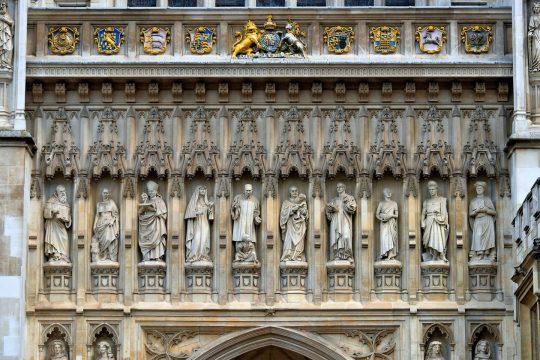

Quid est martyrium? Mortem pati pro Christo. Quid est Christianum? Christum sequi*
- St. Augustine
What is martyrdom? To suffer death for Christ. What is a Christian? To follow Christ.*
After the restoration of the western towers of the Abbey had been completed in 1995, it was decided to fill the 10 gothic niches above the west doorway with statues. The lower part of the towers date from the 15th century and the tops of the towers were completed in 1745. The niches never had statues, although this was obviously the plan of decoration.
It was decided to use the ten niches not just to commemorate saints or worthy figures from the past. So instead of traditional figures of kings or saints, the abbey decided that martyrs of the 20th century should be remembered. The West entrance was to proclaim a message of which too few people are aware: the 20th century was a century of Christian martyrdom. Although the statues are of individual martyrs they are intended to represent all those others who have died (and continue to die) in similar circumstances of oppression and persecution. Their statues were drawn from every continent and many Christian denominations.
Four sculptors completed the statues, carved from French Richemont limestone. The Archbishop of Canterbury, George Carey, unveiled the statues in July 1998 at a service attended by HM Queen Elizabeth II.

The ten Christian modern martyrs are (from left to right):
Maximilian Kolbe: a Catholic priest who helped Jews in Poland and who died in Auschwitz in 1941 after offering to take the place of a condemned man.
Manche Masemola: a 16-year-old girl from South Africa who was killed by her parents in 1928 when she converted to Christianity.
Janani Luwum: the Archbishop of Uganda who was murdered on the orders of Idi Amin in 1977.
Grand Duchess Elizabeth Feodorovna: a member of the Russian Imperial family (by marriage) who founded a convent but was murdered by the Bolsheviks during the Russian Revolution.
Martin Luther King: the American civil rights campaigner who was murdered in 1969.
Oscar Romero: the Archbishop of San Salvador, murdered by a death squad in 1980.
Dietrich Bonhoeffer: a Lutheran theologian who was implicated in the bomb plot against Adolf Hitler and executed in 1945.
Esther John: a Pakistani nurse and Christian evangelist who was murdered by a Muslim relative in 1960.
Lucian Tapledi: an Anglican in New Guinea who was killed by invading Japanese troops in 1942.
Wang Zhiming: a Christian pastor in China who was executed in 1973 during the Cultural Revolution.
In June 1953, during Her Late Majesty Queen Elizabeth II’s coronation, she entered through the west door of London’s Westminster Abbey. During her arrival, she was received by massed choirs singing “I was glad when they said unto me, we will go into the house of the Lord” (Psalm 122, 1-3,6, 7.)
On 6 May, King Charles III and Queen Consort Camilla will be crowned at Westminster Abbey. For many, this will be the first coronation they have ever seen. The ceremony will follow a pattern laid out in the Liber Regalis, kept at Westminster Abbey and which has informed the pattern of coronations since the 14th century. The service which will see the Coronation of King Charles and Queen Camilla will include the same elements as the historic coronations which have gone before and everything starts with their entry to the Abbey. This means King Charles III will enter the Abbey through the West door and under the statues of these 10 Christian modern martyrs.
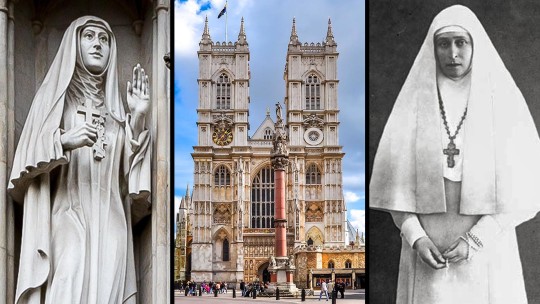
For King Charles III it will have a particular personal resonance as he will walk under the soulful gaze of his great-great aunt through his father’s side (the late Prince Phillip, Duke of Edinburgh), Grand Duchess Elizabeth Feodorovna.
Elizabeth of Hesse-Darmstadt was born on 1 November 1864. Her mother died when she was a child, and she came to England to live with her grandmother, Queen Victoria. Her childhood was Lutheran and her adolescence was Anglican. Elizabeth married Grand Duke Sergei Alexandrovich, the fifth son of Tsar Alexander II of Russia in 1884, and joined the Orthodox Church in 1891.
When her husband was assassinated in 1905, she gave away all her jewellery, sold her most luxurious possessions, and opened the Martha and Mary home in Moscow. Elizabeth and 17 of her companions formally became nuns in 1909. They soon opened a hospital and began other philanthropic works.
The Tsarist state collapsed in March 1917, and the Bolsheviks seized power in October 1917. Elizabeth was arrested with two sisters from her convent on 7 May 1918, and transported across country to Perm, then to Ekatarinburg, and finally to Alapaevsk. On 17 July, the Tsar and his family were shot dead. During the following night, Elizabeth, Sister Varvara, and members of the royal family were murdered in a mineshaft. Elizabeth was recognised as a saint by the Russian Orthodox Church Abroad in 1984 and by the Moscow Patriarchate in 1992.
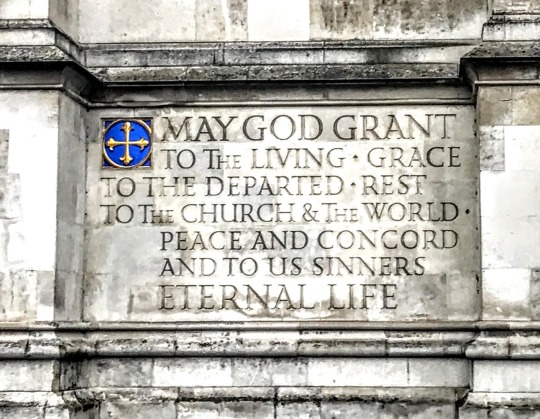
Had there been more than ten niches available, there would have been other candidates available for inclusion in Westminster Abbey. As it stands, this memorial makes a powerful statement about the fact that people are still dying for their Christian beliefs in the present age. Although most cathedrals only seem to commemorate people who are long-dead and long-forgotten, Westminster Abbey bucked the trend in a dramatic and highly poignant way.
#st augustine#augustine#quote#westminster abbey#martyrs#martyrdom#christianity#west door#modern martyrs#statues#coronation#king charles III#monarchy#cathedral#church#faith#heritage#custom#tradition#christian#society#britain#england
51 notes
·
View notes
Text
Faith's Checkbook

by Charles Spurgeon
Weapons Doomed to Fail
"No weapon formed against you shall prosper…"
– Isaiah 54:17
There is great clatter in the forges and smithies of the enemy. They are I making weapons wherewith to smite the saints. They could not even do as much as this if the LORD of saints did not allow them; for He has created the smith that bloweth the coals in the fire. But see how busily they labor! How many swords and spears they fashion! It matters nothing, for on the blade of every weapon you may read this inscription: It shall not Prosper.
But now listen to another noise: it is the strife of tongues. Tongues are more terrible instruments than can be made with hammers and anvils, and the evil which they inflict cuts deeper and spreads wider. What will become of us now? Slander, falsehood, insinuation, ridicule-these are poisoned arrows; how can we meet them? The LORD God promises us that, if we cannot silence them, we shall, at least, escape from being ruined by them. They condemn us for the moment, but we shall condemn them at last and forever. The mouth of them that speak lies shall be stopped, and their falsehoods shall be turned to the honor of those good men who suffered by them.
19 notes
·
View notes
Text
SAINT OF THE DAY (January 27)

Angela Merici, foundress of the Ursuline Sisters, was born in the small Italian town of Desenzano on the shore of Lake Garda on 21 March 1474.
As a young girl, Angela lost in succession to her sister and parents. She went to live with a wealthy uncle in the town of Salo where, without benefit of formal schooling, Angela grew in poise, wisdom, and grace.
The age in which Angela lived and worked was a time that saw great suffering on the part of the poor in society.
Injustices were carried on in the name of the government and the Church, which left many people, both spiritually and materially, powerless and hungry.
The corruption of moral values left families split and hurting. Wars among nations and the Italian city-states left towns in ruins.
In 1516, Angela came to live in the town of Brescia, Italy.
Here, she became a friend of the wealthy nobles of the day and a servant of the poor and suffering.
Angela spent her days in prayer and fasting and service.
Her reputation spread and her advice was sought by both young and old, rich and poor, religious and secular, male and female.
But still, Angela had not yet brought her vision to fruition.
After visiting the Holy Land, where she reportedly lost her sight, Angela returned to Brescia, which had become a haven for refugees from the many wars then wracking Italy.
There, she gathered around her a group of women who looked toward Angela as an inspirational leader and as a model of apostolic charity.
It was these women, many of them daughters of the wealthy, some orphans themselves, who formed the nucleus of Angela's Company of St. Ursula.
Angela named her company after St. Ursula because she regarded her as a model of consecrated virginity.
Angela and her original company worked out details of the rule of prayer, promises, and practices by which they were to live.
The Ursulines opened orphanages and schools.
In 1535, the Institute of St. Ursula was formally recognized by the Pope and Angela was accorded the title of foundress.
During the five remaining years of her life, Angela devoted herself to composing a number of Counsels by which her daughters could happily live.
She encouraged them to "live in harmony, united together in one heart and one will. Be bound to one another by the bond of charity, treating each other with respect, helping one another, bearing with one another in Christ Jesus.
If you really try to live like this, there is no doubt that the Lord our God will be in your midst."
In 1580, Charles Borromeo, Bishop of Milan, inspired by the work of the Ursulines in Brescia, encouraged the foundation of Ursuline houses in all the dioceses of Northern Italy.
Charles also encouraged the Ursulines to live together in community rather than in their own homes.
He also exhorted them to publicly profess vows of poverty, chastity, and obedience.
These actions formalized Angela's original "company" into a religious order of women.
Angela Merici died on 27 January 1540
She was beatified by Pope Clement XIII on 30 April 1768. She was canonized by Pope Pius VII on 24 May 1807.
6 notes
·
View notes
Text
Even we ourselves groan within ourselves, waiting for the adoption, to wit, the redemption of our body. Romans 8:23
We groan, but it is "within ourselves." It is not the hypocrite's groan, by which he would make men believe that he is a saint because he is wretched. Our sighs are sacred things, too hallowed for us to express. Then the apostle said that we are "waiting," by which we learn that we are not to be petulant, like Jonah or Elijah, when they said, "Let me die." Neither are we to whimper and sigh for the end of life because we are tired of work. Nor should we wish to escape from our present sufferings until the will of the Lord is done. We are to groan for glorification, but we are to wait patiently for it, knowing that what the Lord appoints is best. Waiting implies being ready. We are to stand at the door, expecting the Beloved to open it and take us away to Himself.
This "groaning" is a test. You may judge a man by what he groans after. Some men groan after wealth–they worship money. Some groan continually under the troubles of life; they are merely impatient. But the man who sighs after God, who is uneasy until he is made like Christ, that is the blessed man. May God help us to groan for the coming of the Lord and the resurrection that He will bring to us.
Charles Spurgeon, 1865
6 notes
·
View notes
Note
ik the gold behind Charles is a van gogh painting but the gold circle reminds me of the halos saints and angles had in pre to early renaissance paintings. like he has this devine beauty around him but the way most of those saints got their halos was to be martyred and suffer in this life for it.
sorry to go on a rant in ur inbox i just think its gorgeously tragic (his shit luck).
no, for real... now that you mentioned it actually looks like that catholic stuff too (idk the name of those in english), even if it wasn't my intention in the very beginning.
charles has this narrative pursuing him, at this point, he can't escape. il predestinato, the chosen one. if not to be the one to see the glory, the guy to bleed himself dry to save the world (the team he loves). maybe he puts himself in this position and i particularly believe he is aware of it, but he chooses to continue on this "path".
my answer was also a bit poetic and we are just talking about a blog layout LOL but anyway, ily <3
12 notes
·
View notes
Text
Bloodborne characters names meaning & signification
A few weeks ago, I looked at the meanings/origins of some of the characters names. Some were quite interesting! So, I’ve wanted to do a big post with ALL the names we know to share with everyone.
There are already some great posts about the translations of the original Japanese names and winch countries these names originated from (so I won’t go in details on that).
I won’t detailed either how the dev might have chosen this or this name because it’s also the name of an important history/religious figure either. And I won’t be talking about the great ones names, the locations names or the item/weapon names (except a few). But this post on reddit explained it well.
A lot of names have European roots. Latin (central& west), but also Slavic (north & east) and there’s a lot of old French names too. I hope this post could provide some insight or just be a reference if someone is looking for something. If you know something else let me know !
Let’s begin then! (I classified them by alphabetical order):
Adeline: Meaning noble, nobility, noble one.
Adella: Meaning noble too, kind…
Alfred: “elf/magical counsel”, wise counsellor, wise, sage…
Amelia: work, hard work / (Emilia (it might be the original intended name: rival, laborious, eager).
Annalise: Grace of/by God & similar sentences, or even graceful light.
Antal: break of day, inestimable worth/priceless one/beyond price.
Archibald: genuine, bold, brave.
Arianna: most holy, silver.
Brador is not a name that exist so the closet thing that exist is “Bardot/Bardeau”, it seems to be a location name to a family coming from Perigord (west France, actual department/county of Dordogne).
Caryll means “man” and seems to come from the name Carroll (man) or Charles (free man).
Damian: to tame, subdue. In Greek Damianos means master, overcome, conquer; Saint Damien was the patron of the physicians (another Christian martyr).
Djura is not a name that exist. It would be a variant of Georges/Jorge apparently (farmer).
Dores: Came from “doré”, golden in French. It was given to people with blonde hair apparently. But it seems to mean pain, suffering, (lady of) sorrows. Came from Dolores meaning “pain”. That same latin word give “douleur” (pain) in French as well.
Edgar (/Edgard): means rich/ prosperous and spear.
Eileen: (little) bird, strength, desired, bright one, shining light in Greek, (derived from Evelyn it seems it could come from Irene/Helen… too)
Evelyn: desired, whished for (fit with the description of weapon?), beauty, water, island (fit with Cainhurst) and “whished for child” too… (it’s not the only one like you will see a bit later…it’s a bit weird that it’s another person of Cainhurst who share this meaning too).
Gascoigne: Like the origin of “Brador” it’s a French surname, meaning someone who came from Gascony/pays de Gascogne, actual department/county of “des Landes” & “Hauts Pyrénées”, southwest of France.
Gehrman:
Russian/Slavic origin and means spear, spear bearer/user or something related to it. And he indeed does have a scythe so… It’s also the alternative name of a Caloian/Bulgarian ritual. In it, a “clay doll/effigy” is broken or buried (funeral?) to fertilize the earth (circle of life & death too etc…) So, it’s really interesting and intriguing. And “German” means Warrior.
Gilbert: bright promise, pledge, hostage, bright/famous (the feels T_T)
Gratia: favor, blessing, grace
Gremia: doesn’t exist too; the closet is Geremia who means “god is high/the lord exalts (Jeremiah, Jeremy…)
Henriett/(Henriette): home leader/ruler, keeper of the hearth
Henryk: home leader too
Iosefka: “god will provide”? it’s not really a real name. Jozefka/Jozefina see Jozef
Izzy: god’s promise, (gift of Isis/god). Could be another variant of Georges/ Isidore/ Isabel-Isaac…even Elizabeth perhaps…
Jozef: “Jehovah (he should)increases” (Joseph)
Laurence: boy & girl name meaning “from Laurentum” (city in Italy). That came from Laurel (Laurier) too (the crown wear by the Roman emperor).
Saint Laurence is also a christian martyr figure during the end of the roman empire who was burned alive. When asked where he hid the treasures of the church, he says the true treasures where the people, the poors.
Leo (cut Vileblood hunter): in latin it means lion, so “lion hearted, brave” as well
Logarius: it doesn’t’ exist. This one is really complicated but from what I found the first half could be “reason, judgment…”+ Christians figure. From a retranslation we can find something close to “Roger” meaning “famous spearman”.
Ludwig: it means “famous fighter/warrior/in battle” it fit well indeed.
Madaras: Is a surname, it seems to mean “impure, bald, humid, wet, spots…” it depends on the language too.
Maria:
I saw a lot of different meaning for this one. I tried to put everything I could here but there’s a lot. What’s sure is that I personally think that all this meaning perfectly describes our dear lady of the Astral Clocktower! It’s actually crazy how some of these seems to characterize her so well. (Well done fromsoftware)
So, we got: star/drop/lady of the sea, (sea of) bitter, “” sorrow (sometimes these meanings are mixed), rebellious, beloved/loved and “wished for child”.
A common 18-19th century name. (A lot of important figures had that name. The more known is Saint Maria/Mary the mother of Jesus.
Micolash: monkey/primate it seems but “Nicholas” means “victory of the people/people of victory”. St Nicholas is the patron of children, scholars, sailors…
Norbert (cut content, originally the name of the cleric beast: “northern brightness”. It was the name of a saint too.
Olek: “defender of men/humankind/people, protector of – “
Paarl: not really a name (or an African one at least) and means pearl & perhaps the Japanese name is closer to “Paul” that means small or humble. Name of a saint too.
Patches: Well, our dear spider… comes from “Peter” means rock/stone, fight, patch (Patch seems to signify “noble” too?). under this form it’s more a female name as well?
Rom (Roma in Japanese): Our other dear spider. Reference Roma/Rome the city and Roman (empire). It’s also another name of the goddess Lakshmi (Hindu)…
Simon: to (be) hear/listen, reputation
Valtr: easily upset, unstable, unsteady but also to rule, army, warrior
Viola: purple; violet (the flower)
Vitus: “lively, life giving, life”; came from the latin “vitae” who give “vie” in French, who means life. Could come from Vitu/widu which signifies woods, forest.
Wallar: wallfahrer, pilmgrim (family name) it’s in the theme or the chalice dungeon enemies. And Waller means “wall maker, powerful one”
Willem: means “resolute/determined protector”, defender, guardian, helmet
(The Defender of knowledge/ eldritch truth? The protector of humans from it? It’s quite interesting as well).
Yamamura: “mountain village” a Japanese name of course
Yurie (Julie): grace of the lily (Japanese) Depends of the 3 kanji used but could signified: reason, logic, blessing, friend, lily, branch… Julie would be a more appropriate translation, it means “youthful”
Bonus:
Mergo: related to water and hide, “flood, swallow, hide, conceal, bury »; the latin name gives submerged & immerged…
Flora: What a surprise, flowers
Lucen: it’s the name I give to my hunter; I wanted to named him “Lucien” but I needed something unique too, so I come up with this. It means “light”.
Byrgenwerth or the college of the grave, surround by water
Byrgen: burial place, grave, tomb,
Werth : surrounded by water
Cainhurst -> Cain. Son of Adam & Eve, killed his brother Able, sins etc… but I saw something relating it to some woods too?
Rakuyo: fallen leaf
#bloodborne#bloodborne analysis#bloodborne lore#bloodborne characters#bloodborne thoughts#bloodborne characters names#fromsoftware#I hope I didn't forgot anyone who have an actual real name#(inserts all the characters names)#eileen the crow#gehrman the first hunter#laurence the first vicar#ludwig the holy blade#lady maria of the astral clocktower#micolash host of the nightmare#father gascoigne#old hunter henryk#provost willem#iosefka#adella the nun#arianna woman of the night#saint adeline#retired hunter djura#valtr master of the league#brador church assassin#alfred hunter of vilebloods#queen annalise
65 notes
·
View notes